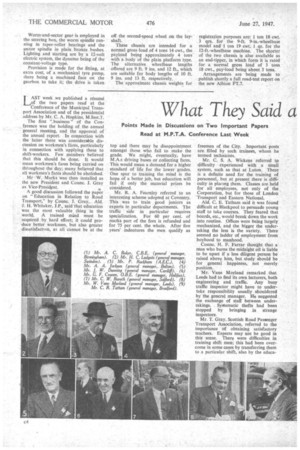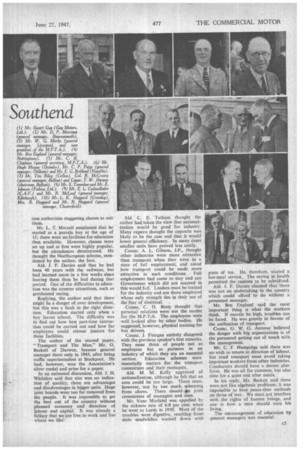What They Said a Southend
Page 42

Page 43

If you've noticed an error in this article please click here to report it so we can fix it.
Made in Discussions on Two Important Papers Read at M.P.T.A. Conference Last Week
LAST week we published a résumé of the two papers read at the Conference of the Municipal Transport Association and of the presidential address by Mr. C. A. Hopkins, Minst.T.
The first ",business" of the Conference was the holding of the annual general meeting, and the approval of the annual report. In connection with the latter there was considerable discussion on workmen's fares, particularly in connection with applying these to shift-workers. Few members believed that this should be done. It would mean workmen's fares being carried on throughout the day; many believed that all workmen's fares should be abolished.
Mr W. Marks was then installed as the new President and Counc. J. Gray as Vice-President.
A good discussion followed the paper on "Education in Relation to Road Transport," by Counc. J. Gray. Aid. .J. H. Whitaker, J.P., said that education was the most valuable thing in the world. A trained mikid must be acquired by hard effort; it could produce better workmen, but also greater dissatisfaction, as all cannot be at the top and there may be disappointment amongst those who fail to make the grade. We might, eventually, have M.A.s driving buses or collecting fares. This would mean a demand for a higher standard of life for the lower grades. One spur to training the mind is the hope of a better job, but education will fail if only the material prizes be considered.
Mr. R. A. Fearnley referred to an interesting scheme adopted at Coventry. This was to train good juniors as experts in particular departments. The traffic side in particular requires specialization. For 60 per cent, of marks part of the fees is refunded and for 75 per cent, the whole. After five years' indentures the men qualify as freemen of the City. Important posts are filled by such trainees, whom he termed technicists.
Mr. C. S. A. Wickens referred to difficulty experienced with a small system, such as that at Luton. There is a definite need for the training of personnel, but at present there is difficulty in placing them. Classes are held for all employees, not only of the Corporation, but for those of London Transport and Eastern National.
Aid. C. E. Tatham said it was found difficult at Blackpool to persuade young staff to take courses, They feared that boards, etc., would break down the work into routine. Offices were being largely mechanized, and the bigger the under-. taking the less is the variety. There seemed no ladder of employment from boyhood to manhood.
Counc. H. F. Farrar thought that a' man who burns the midnight oil is liable to be upset if a less diligent person be raised above him, but study should be for general happiness, not merely position.
Mr. Vane Morland remarked that Leeds had to find its own lecturers, both engineering and traffic. Any busy traffic inspector might have to undertake responsibility usually, shouldered by the general manager. He suggested the exchange of staff between undertakings. Systematic thefts had been stopped by bringing in strange inspectors, Mr. T. Gray, Scottish Road Passenger Transport Association, referred to the importance of obtaining satisfactory teachers. Experts may not be good in this sense. There were difficulties in training shift men; this had been overcome in some cases by transferring them to a particular shift, also by the educa tion authorities staggering classes to suit them.
Mr. L. T. Merrall mentioned that he started as a parcels boy at the age of 15; there were no facilities for education then available. However, classes were set up and at first were highly popular, but the attendances deteriorated. He thought the Northampton scheme, mentioned by the author, the best.
Aid. J. E Davies said that he had been 40 years with the railways, but had learned more in a few weeks since leaving them than he had during that period. One of the difficulties in education was the counter attractions, such as greyhound racing.
Replying, the author said that there might be a danger of over development, but this was a fault in the right direction. Education started only when a boy leaves school. The difficulty was to find out how best part-time instruction could be carried out and how far employers could release juniors for these facilities.
The author of the second paper, "Transport and The Man," Mr. G. Beckett of Darwen, became general manager there only in 1945, after being traffic superintendent at Stockport. He had, however, won the Association's silver medal and prize for a paper.
In an animated discussion, Aid. I. H. Whitaker said that size was no indica
t5. tion of quality; there are advantages and disadvantages in bigger units. Huge joint boards were too far removed from the people. It was impossible to get the best out of the country without planned economy and direction of labour and capital. It was already a fallacy that we are free to work and live where we like. Aid. C. E. Tatham. thought the author had taken the view that nationalization would be good for industry. Many experts thought the opposite was likely to be the ease and that it would lower general efficiency, In many cases smaller units have proved less costly.
Counc. A. L. Gibson, J.P., thought other industries were more attractive than transport when they were in a state of full employment, and asked how transport could be made more attractive in such conditions. Full employment had come to stay and any Government which did not succeed in this would fail. Leaders must be trained for the industry and not those employed whose only strength lies in their use of the fear of dismissal. .
Counc.C. H. Bratt thought that personal relations were not the matter for the M.P.TA. The employees were well looked after by other bodies. He suggested, however, physical training for bus drivers.
Counc. J. Finegan entirely disagreed with the previous speaker's first remarks. They must think of people not as employees but as partners in an industry of which they are an essential section. Education schemes were essentially matters for the transport committees and their managers.
Aid. M. M. Kelly approved of nationalization, although he felt that an area could be too large. There must, however, not be too much scheming from above. There should aim joint committees of managers and men.
Mr. Vane Morland was appalled by the sickness rate of 6-8 per cent, when he went to Leeds in 1930. Most of the troubles were digestive, resulting from stale sandwiches washed down with pints of tea. He, therefore, started a hot-meal service. The saving in health permitted the canteen to be subsidized.
Aid. J. F. Davies claimed that there was not an undertaking in the country which could 'afford to do without a personnel manager.
Mr. Ben England said the most important thing is what the workers think. If morale be high, troubles can be faced. He was greatly in favour of the unification of transport.
Counc. G. W. G. Armour believed the danger with big organizations is of the personnel getting out of touch with the management.
Mr. C. F. Humpidge said there was no wish to return to direction of labour, but road transport must avoid taking important workers from other industries. Conductors should have a decent platform. He was all for canteens, but also time for a quiet rest after meals.
In his reply, Mr. Beckett said these were not like algebraic problems; it was impossible to base peace-time methods on those of war. We must not interfere with the rights of human beings, and one is how a man should earn his
The encouragement of education by general managers was essential




































































































